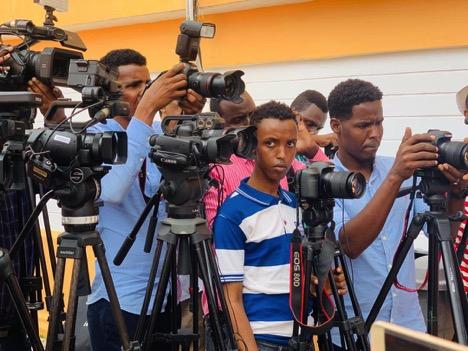Somali journalists lament over impunity for crimes committed against them
Submitted by fkakooza on

Any Somali teenager would confess that they were born to the sound of gunfire, probably made their first step into a terrorist’s foot print, have treaded on the same ground with war tanks, and that they have lived all their lives in a war-torn nation. Somalia has been at war for over 20 years. The conflict has since the 1980s transitioned from civil war, to state collapse, clan factionalism, and now a globalised ideological conflict.
Defined by unrest, violence and conflict, Somalia would be a no-go zone for any journalists. Nonetheless, journalists have to perform their social responsibility role. As of April 2020, records by the Committee to Protect Journalists (CPJ) show that at least 69 journalists had been killed in Somalia for their work. The numbers have since shot to 73 as of 2023.
As per Article 18 of the provisional Somali Constitution, “Every person has the right to have and express their opinions and to receive and impart their opinion, information and ideas in any way. Freedom of expression includes freedom of speech, and freedom of the media, including all forms of Electronic and web-based media. Every person has the right to freely express their artistic creativity, knowledge, and information gathered through research.”
Though such provisions vividly imprint the right to freedom of expression for citizens and journalists alike, the extreme state control of the media makes it utterly impossible to practice journalism.
According to a 2022 press statement by the National Union of Somali Journalists (NUSOJ): Hashim Omar Hassan, a reporter for Shabelle Media Network, was arrested in December 2022 by Galmudug local police on the direct orders of Galmudug President Ahmed Abdi. This is one of the few cases of press freedom hindered by the State.
“We condemn the continued detention of journalist Hashim Omar Hassan on charges that cannot be revealed more than 24hours later. We demand for his unconditional release or arraignment before a competent court,” said NUSOJ Secretary General Omar Faruk Osman a day after Hassan’s arrest.
Despite the day-to-day outcries of journalists regarding violations to their freedoms, less or nothing has been done to bring justice. Following a legal petition seeking justice for the killings of more than 55 journalists in May 2020, the court ordered the Attorney General to conduct investigations. In response the Attorney General appointed a Special Prosecutor in September 2020. Since then, there has been little evidence of credible investigations due to limited capacity and support to the office of the Special Prosecutor.
Clear enough, journalists practicing in Somalia are at the frontline of both physical and psychological torture. Omar Abdisalan, a correspondent with the Associated Press in Mogadishu, maintains that limited or no significant work has been done regarding the safety, insurance and protection of journalists.
“Somalia lacks laws and policies aimed at safeguarding journalists’ physical and psychological well-being, leaving them vulnerable to harm. In the unfortunate event of a journalist passing away while performing their duties, there is no adequate compensation set aside for their family, and they may only be fortunate if the organisation covers the burial expenses.” Abdisalan said.
Journalist Mohamed Isse Hassan was killed in a double car bombing as he, together with other two journalists and a camera assistant rushed from their offices to investigate a blast at a nearby building. While Hassan died on the spot, his other colleagues, Feisal Omar Hashi, a stringer for Reuters, Abdulkadir Mohamed Abdulle for Voice of America, Somali and M24 TV and Bile Abdisalan Ahmed, a camera assistant for Hashi, escaped with grave injuries. No compensation whatsoever was rendered to cover any of the losses incurred in the line of duty.
As stated by Human Rights Watch, on October 12, 2014, Abdirisak Jama Elmi, a veteran journalist working for the private Somali Channel TV, was outside his home in Mogadishu when a man in a car started shooting. “As I was trying to escape the man started shooting automatic rounds and I felt as though he hit me about 10 times in my back,” Abdirisak said. “I could hear several voices telling the shooter to aim better. I could hear them saying, “He is still alive!” As a result of his injuries, he can no longer carry out his reporting activities.
Following the attack, government officials including the head of the National Intelligence and Security Agency (NISA) promised accountability. Yet, Abdirisak says he was never been interviewed or asked to give a witness statement about his attack. He continues to live in fear: “The attackers are still alive, they know me and I don’t know them.”
“International media organisations have stepped in to offer training and trauma healing to support the Somali media. However, the training is only available to a selected few journalists working with the international press, with local journalists rarely having access to such valuable training opportunities,” says Abdisalan, a correspondent for the Associated Press in Mogadishu.
Somalia, a country with a complex history of civil unrest, political instability, and ongoing conflict with extremist groups, is a pot of hot soup to handle as a journalist. Journalists working in Somalia are vulnerable to violence and intimidation from various corners. Local journalists and freelancers with no formal affiliation lack protection and insurance despite the violent sphere from where they operate. Organisations that hire media personnel ought to provide insurance as well as assure their safety to hold the bad from getting worse.
- 543 reads
